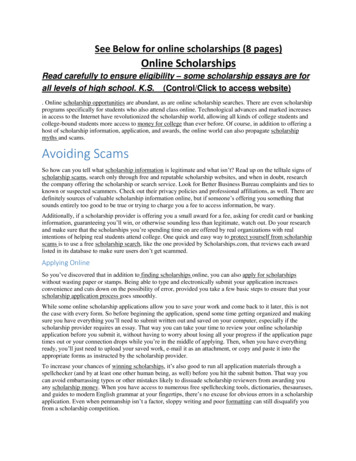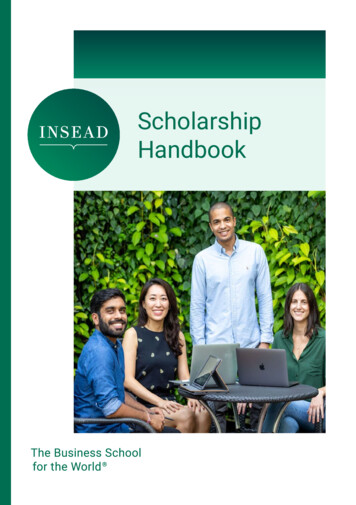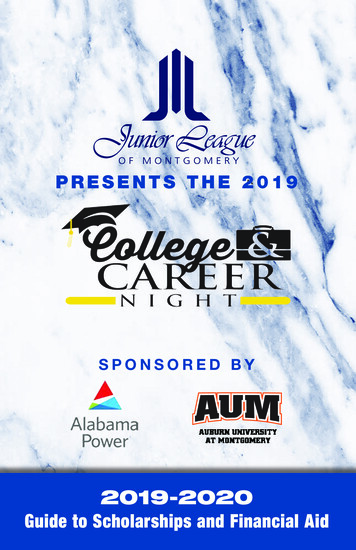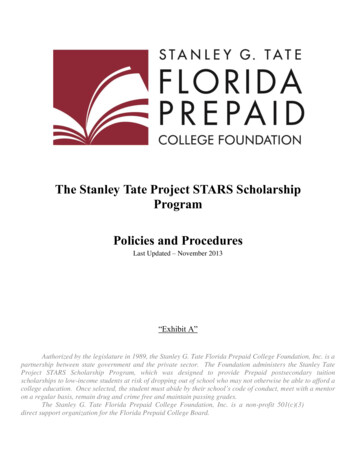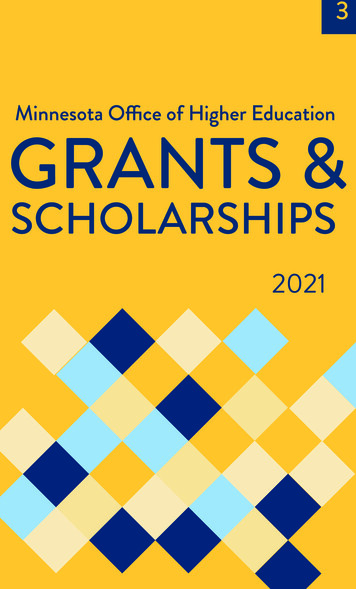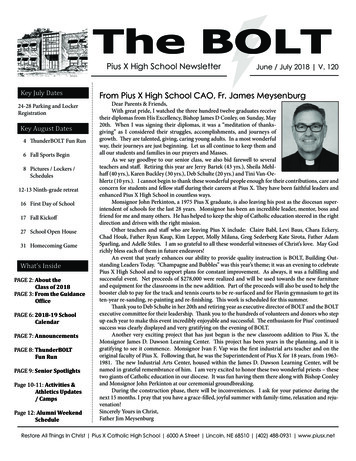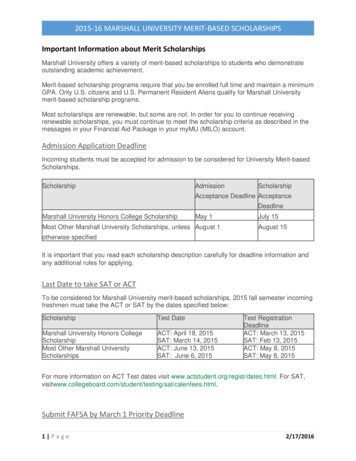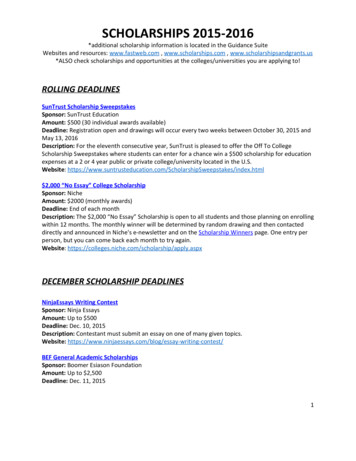
Transcription
Heroes of Our Time Scholarships 2015Since 1988/1989 the Assembly of First Nations (AFN) has sponsored the Heroes of Our Time scholarshipsto recognize the hard work, dedication and academic achievements of First Nations post-secondarystudents who demonstrate excellence in a variety of categories. The scholarships are divided into eightcategories that represent eight First Nations heroes and academic disciplines, each with a value of 2,000.The scholarships are made possible through the sponsorship of the RBC Foundation.The Heroes of Our Time scholarships provide an excellent opportunity for the AFN to acknowledge andcelebrate the success of First Nations students in achieving their educational goals. It gives us greatsatisfaction to know that we are helping those who hold the future of First Nations in their hands.The deadline for submitting applications to the Heroes of Our Time scholarship will be March 1, 2015.Applications must include a completed application form, 1,500 word essay, official transcript, two (2) referenceletters, and proof of First Nations ancestry.The essay should outline why you should receive the Heroes of Our Time scholarship. Be sure to include reasonswhy you chose your field of study, various accomplishments, future career plans, interests, volunteer andcommunity work with any First Nations community or organization.It is strongly encouraged that the letters of reference are included in your application package to ensure theyarrive on time. Please include names and contact information for your two references as well.Applicants are only eligible for one category. Applications with more than one category selected will beconsidered ineligible.Only official transcripts will be accepted. No photocopies or faxed copies. All application packages can be sent to:HOOT Scholarship Awards Selection CommitteeAssembly of First Nations55 Metcalfe St., Suite 1600Ottawa, ON K1P 6L5OR they can be faxed to (613) 241-5808. Official transcripts must still be mailed.
Jake Fire AwardCRIMINOLOGYJake Fire was a Mohawk and strong defender of the IroquoisConfederacy. Like his ancestors, he was a citizen of a society whichpracticed a sophisticated order of government long before the arrivalof Europeans. On May 1, 1899, he was assassinated by the CanadianDominion Police while attempting to protect his brother, Grand ChiefJacob Fire, from arrest during a police led ambush. Alerted by his sisterin the early hours of the morning, Jake rushed to the Council Hall,where his brother the Grand Chief and several other men from thereserve lay in handcuffs on the floor surrounded by police. As he camethrough the door, a police officer shot twice at point blank range. Thesecond bullet was fatal.The Jake Fire memorial award is provided to an applicant who hascompleted at least one year of post-secondary education in the field ofCriminology, has demonstrated exceptional academic abilities, and hasbeen involved and shown a commitment to extracurricular/ volunteeractivities.Tommy Prince AwardNATIVE STUDIESSgt. Tommy Prince, from the Brokenhead First Nation in Scanterbury,Manitoba, received the highest military decoration for bravery the Silver Star. An excellent marksman, Tommy was an army spotterin World War II and brought down heavy artillery fire on the enemyat the risk of his own life. He served in the elite “Devil’s Brigade” forthe duration of the war, then reenlisted in the Korean War years later.Tommy continued in the tradition of his grandfather, Peguis, thefamous Saulteaux Chief.The Tommy Prince memorial award is provided to an applicant who hascompleted at least one year of post-secondary education in the fieldof Native Studies, has demonstrated exceptional academic abilities,and has been involved and shown a commitment to extracurricular/volunteer activities.Walter Dieter AwardSOCIAL WORKWalter Dieter was one of the founders of the National IndianBrotherhood which was formed at the national level to combatassimilation of First Nations peoples. Born on the Peepeekisis FirstNation, Walter became involved in first Nations politics in 1958 whenhe laid the foundation for the Indian and Metis Friendship Centre inSaskatoon, Saskatchewan. In 1966, he helped establish the Federationof Saskatchewan Indian Nations and became its first leader.The Walter Dieter memorial award is provided to an applicant who hascompleted at least one year of post-secondary education in the field ofSocial Work, has demonstrated exceptional academic abilities, and hasbeen involved and shown a commitment to extracurricular/ volunteeractivities.Omer Peters AwardPOLITICAL SCIENCEOmer Peters was described as a “people person.” He alwaysexpressed his undying faith in the First Nations people acrossthe country. Born in Moravian on the Thames, Ontario, he workedfor seventeen years at the community level and dreamed of thetime when First Nations people across Canada would be united insolidarity. Beginning at the provincial level, he was a founding memberof the Union of Ontario Indians and served as its President and thenExecutive Director. With experience gained at the provincial level,Omer moved to the national scene and helped establish the NationalIndian Brotherhood. He became Vice-President and later Chairman ofthe Council of Elders.The Omer Peters memorial award is provided to an applicant who hascompleted at least one year of post-secondary education in the fieldof Political Science, has demonstrated exceptional academic abilities,and has been involved and shown a commitment to extracurricular/volunteer activities.Robert Smallboy AwardMEDICINEChief Robert Smallboy was from the Cree Nation Ermineskin Bandof Alberta. He served as Chief for many years. In 1967, determinedto remove his people from the devastation of the encroaching westernworld, Chief Smallboy moved the band into a wilderness area justeast of the Rocky Mountains. There, he set up a survival camp wherehis people could live according to the traditional ways and engagein a healing process. Despite great opposition from Canada and theAlberta government, Chief Smallboy stood strong in his belief that hispeople had a right to live their traditional way and on their traditionallands. He was 82 years old when he appeared as a witness before theCrown in defense of the Ermineskin people’s rights to their lands andway of life.The Robert Smallboy memorial award is provided to an applicant whohas completed at least one year of post-secondary education in thefield of Medicine, has demonstrated exceptional academic abilities,and has been involved and shown a commitment to extracurricular/volunteer activities.www.afn.ca
James Gosnell AwardLAWJames Gosnell, “the father of Aboriginal title”, was a hereditary Chiefof the Eagle Clan of the Nisga’a in British Columbia. A commercialfisherman since boyhood, James decided to enter the political fieldto secure the recognition of Aboriginal title and rights of the Nisga’apeople. With the support of the Council, James pursued the Nisga’aland claim to the Supreme Court of Canada. James was a fearlessadvocate of Aboriginal title and rights and displayed his oratory talentsto the fullest during the First Minister’s Conference on AboriginalMatters from 1983-1987.The James Gosnell memorial award is provided to an applicant whohas completed at least one year of post-secondary education in thefield of Law, has demonstrated exceptional academic abilities, and hasbeen involved and shown a commitment to extracurricular/ volunteeractivities.John Young AwardSCIENCEJohn Young was a Chief of The Pas First Nation, an Elder fromSwampy Cree Tribal Council, a senator for First Nations and apositive role model for all Aboriginal people. John believed that one ofthe keys to First Nations success, prosperity and sovereignty is througheducation. John always encouraged and supported First Nationspeople to attain the highest levels of education and use the acquiredknowledge and skills to enhance the lives of all Aboriginal people. Heenvisioned the day when Canada would be enriched by First Nationslawyers, doctors, law makers, educators, corporate executives, politicalscientists and social scientists.The John Young memorial award is provided to an applicant who hascompleted at least one year of post-secondary education in the fieldof Science, has demonstrated exceptional academic abilities, and hasbeen involved and shown a commitment to extracurricular/ volunteeractivities.Doctor Freda Ahenakew AwardEDUCATIONFreda Ahenakew was born on the Ahtahkakoop First Nation. Shereceived her early education at the Day School in Ahtahkakoop andlater at the Prince Albert Collegiate Institute. She convocated fromthe University of Saskatchewan with a Bachelor of Education in 1979and from the University of Manitoba with a Masters of Arts in 1984. In1997, the University of Saskatchewan awarded Freda with an HonoraryDoctor of Laws degree. In 1999, the Governor General of Canadaawarded Freda with the Order of Canada. She has been honoured withnumerous other awards as well.She has taught at the Saskatchewan Indian Cultural Centre, the LacLaRonge Band and Saskatoon Native Survival. From 1983-85 shewas Assistant Professor at the University of Saskatchewan and thenbecame the Director of the Saskatchewan Indian Languages Institutefrom 1985-89. From 1989 to 1996, Freda was an Associate Professorat the University of Manitoba and became Head of the Departmentof Native Studies from 1990-95. She is recognized as one of the mostdistinguished aboriginal scholars in Canada and a world-class linguist.Her publications have now reached an incredible twenty-nine books aswell as numerous technical papers and journal articles.The Dr. Freda Ahenakew memorial award is provided to an applicantwho has completed at least one year of post-secondary educationin the field of Education, has demonstrated exceptional academicabilities, and has been involved and shown a commitment toextracurricular/ volunteer activitiesElijah Harper AwardCommerceElijah Harper, who became a symbol of power for Canadianaboriginals, was a politician and aboriginal leader for much of hislife, and was best-known for his role in blocking the Meech Lakeconstitutional accord in 1990.Harper was born in Red Sucker Lake, a reserve in northern Manitoba.He attended residential schools in Norway House, Brandon and Birtle,Manitoba, then secondary school at Garden Hill and Winnipeg. Hestudied at the University of Manitoba in 1971 and 1972, and laterworked as a community development worker, a supervisor for theManitoba Indian Brotherhood, and a program analyst for the ManitobaDepartment of Northern Affairs.He was awarded the National Aboriginal Achievement Award in1996, and the Order of Merit from St. Paul’s University in May 1998(Canadian Institute of Conflict Resolution). Other awards include theOrder of the Sash from the Manitoba Métis Federation, and the GoldEagle Award, an outstanding citizen recognition from the IndigenousWomen’s Collective in Manitoba. In the autumn of 1994 he had amysterious illness doctors and native healers could not explain. OnMay 17, 2013, he died of heart failure due to complications fromdiabetes in Ottawa.The Elijah Harper memorial award is provided to an applicant who hascompleted at least one year of post-secondary education in the field ofcommerce/business, has demonstrated exceptional leadership abilitiesby championing the principles of consultation and collaboration,and has been involved and shown a commitment to extracurricular/volunteer activities.www.afn.ca
1. PERSONAL INFORMATIONLast Name:First Name:Male FemaleCurrent Address:Permanent Address:Telephone: (a)(b)Fax:EmailAboriginal Ancestry: Status First Nations (Band Affiliation)Non Status (Ancestry)Must provide proof of First Nations Status or Non-Status First Nations ancestry – a clear photocopy of your Band/Treaty cardor Non-Status First Nation students with First Nations ancestry must send a photocopy of the band card issued to parents orgrandparents and a long-form birth certificate or baptism certificate clearly showing the relationship to the person named on theband card.2. ACADEMIC INFORMATIONEnrolled in (please circle):College/CEGEPUniversityOther:Name of Institution:Location:Province:Area of study:Major/ Faculty:Year of study:(i.e., 2 of 3 yrs)ELIGIBILITY:Students are eligible to apply for the Heroes of Our Time scholarships if you are: A resident of Canada who is either a Status First Nation student or Non Status First Nation student with First Nationsancestry; A currently enrolled and returning full-time student in undergraduate or graduate programs that are a minimum of twoacademic years at an accredited Canadian university or technical college; The applicant has completed at least one year of post secondary studies in a field that coincides with ONE of thescholarships.3. REQUIRED INFORMATIONEssay: Please write an essay, maximum of 1,500 words, highlighting why you should receive a Heroes of Our Time scholarship.Include reasons why you have chosen this field of study, your accomplishments, future career plans, interests, volunteer work andcommunity work in/or with a First Nations community or organization.2015
Identify the Award (ONE only) you are applying for:Jake Fire Award – CriminologyTommy Prince Award – Native StudiesWalter Dieter Award – Social WorkOmer Peters Award – Political ScienceRobert Smallboy Award – MedicineJames Gosnell Award – LawJohn Young Award – ScienceDr. Freda Ahenakew Award – EducationElijah Harper Award – CommerceOfficial Transcript: Please provide an official transcript (no photocopies) of your marks from the current year. This should be included with your application package to ensure that it arrives on time.References: Two letters of reference are required. Please provide the names and contact information of those that will be submitting references on your behalf. It is strongly encouraged that the letters of reference are included in your application package toensure that they arrive on time.Reference #1 - Name & Mailing AddressReference #2 - Name & Mailing Address4. SELECTION PROCESSThe Selection Committee is comprised of representatives of the Assembly of First Nations and a representative of the RBC. TheSelection Committee decision is final; there is no appeal.The Selection Committee recognizes academic goals and achievements, career plans, contributions to one’s community andfinancial need. Special consideration is provided to those students who demonstrate their interest and respect for others byvolunteering within their community/academic institution/field of study, and provide leadership qualities.Eligible applicants must fulfill all application requirements. Failure to submit all required documents by the deadline will disqualifythe applicant.Applications can be forwarded via mail or fax, and must be received by the deadline. The deadline for submitting applications isMarch 1, 2015 to Heroes of Our Time Awards, Attn. Selection Committee, 55 Metcalfe St, Ottawa, ON K1P 6L5. Only successfulcandidates will be notified by telephone.CHECKLIST: Only applications received by the deadline and containing all of the following will be reviewed by the SelectionCommittee.Completed application formEssayOfficial Transcript2 Reference LettersI have read and understand the requirements for applying for the Heroes of Our Time Awards. I understand that the decision of theSelection Committee is final and there is no appeal process for applicants. I agree to allow the Assembly of First Nations to verifythe information provided in my application.Applicant’s Signature:Date:Date received by AFN:Signature:Complete application by March 1st deadline: YESNO2015
The deadline for submitting applications to the Heroes of Our Time scholarship will be March 1, 2015. Applications must include a completed application form, 1,500 word essay, official transcript, two (2) reference letters, and proof of First Nations ancestry. The essay should outline why you should receive the Heroes of Our Time scholarship.

